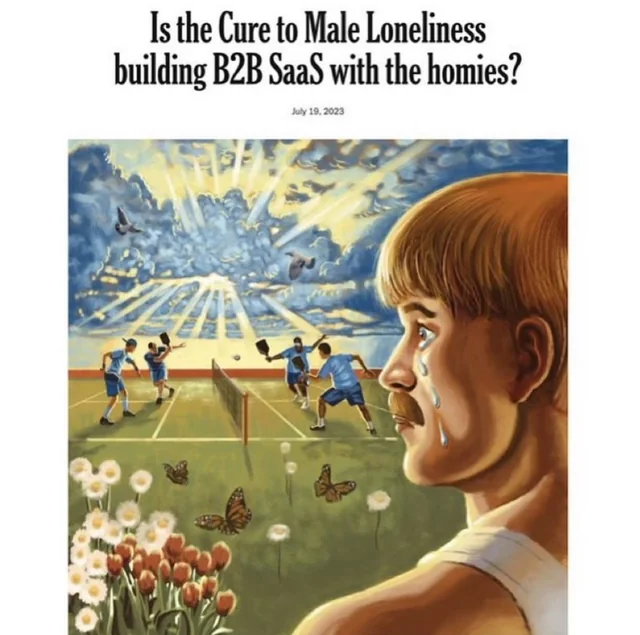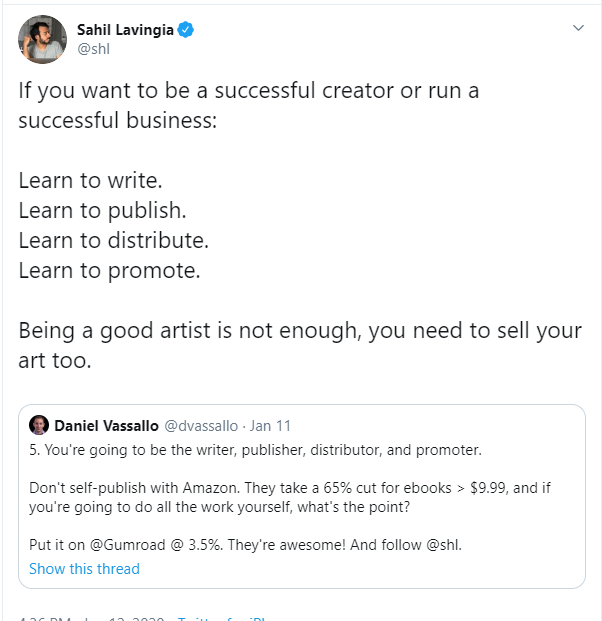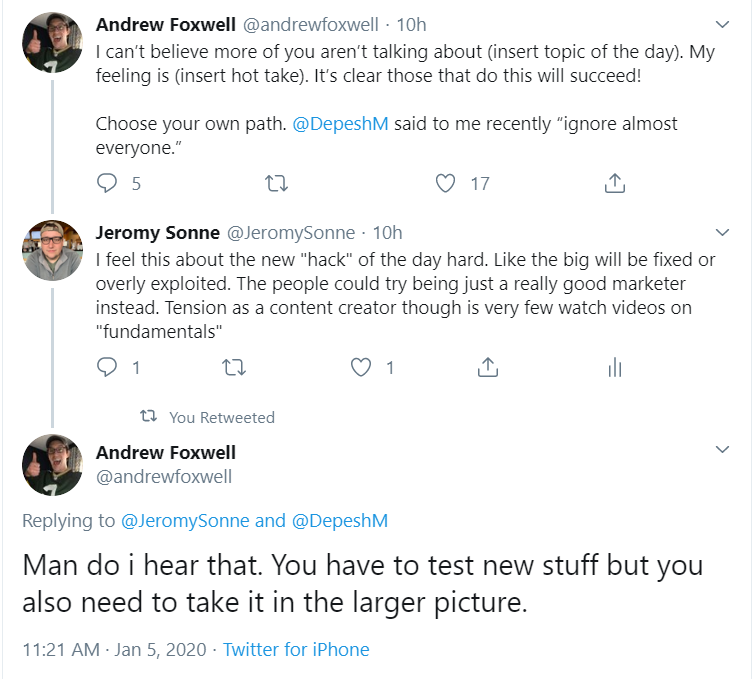I believe in memes as a genuine form of communication—almost like a language in and of itself. I believe it creates a common template of emotions that we can project our unique experiences and insights into, allowing us to connect more readily with the people around us on a deeper, more emotional level compared to purely written word, which biases towards logic over lived experiences. One of my favorite memes that my co-founder and I often share is:

We also have joking variations where we say “shareholder value” instead of B2B SaaS. I believe I first encountered this meme on the “LinkedIn Lunatics” subreddit, which lampoons people who performatively sacrifice themselves for their corporate overlords with the subtext that those corporate masters don’t care about you. It’s essentially illogical to keep killing yourself for people who will happily discard you when convenient. It’s a bad deal, and we’re losing our humanity because of it.
They’re not wrong, and I don’t actually disagree.
Yet my co-founder and I were talking about this meme and how we like to share it with each other, somewhat seriously and somewhat tongue-in-cheek. On a practical level, it isn’t the same dynamic as the LinkedIn Lunatics crowd because we are co-founders of our company and the two biggest shareholders. As both the capitalists and the labor in the equation, there is upside for us in choosing to sacrifice and take on some delayed gratification in a very direct way (we sacrifice, and our share price, in theory, goes up). On a more abstract level, it’s basically corporate accelerationism, calling for people to kill their humanity in service of being perfect capitalistic drones. We share it as a coping mechanism for the extraordinary sacrifices inherent to founding a company—a sort of gallows humor, much like doctors joking about terrible injuries and diseases. I am the person who always laughs when something horrible happens. I don’t know why, but it has been my default subconscious response my whole life. To some degree, this is simply an extension of that.
I’m in the middle of fundraising at the moment. Even when fundraising goes well—and by all accounts, this is the best it has ever gone for me—it is an exhausting and discouraging experience to be told repeatedly all the reasons why you aren’t enough and why your business will fail, all in search of the right capital partner. Even when VCs mean well and are kind, it’s still tough. This inevitably leads to existential questions about why I’m subjecting myself to this and my personal search for meaning. In many ways, fundraising for a startup, when done mindfully and within a level of difficulty that fits inside the “hormesis” or tolerable pain definition, is a journey not just of finding the right capital partner to help your business grow, nor just refining your vision and business model, but also a journey of self-discovery about who I am and what I want from life.
I’ve remarked to more than a few people that I am money-motivated but only up to a point—and that point is relatively low in the grand scheme of the tech world. A top 1% household income gets me everything I want, but I have no need or desire to be a billionaire or something. I sat down once and actually did the math, realizing there is no personal life goal or creature comfort that I couldn’t get by working at a big tech company in a PM or senior marketing role after a few promotions and maybe 5-10 years. Either role, at that level of seniority, is a skill set well within my grasp with moderate to high effort and is a clear path. I want to own a home, be debt-free, and send my kid to college. My stretch goals involve having a sauna in my backyard, a sailboat, and maybe one day opening a small restaurant (a Japanese-Texas fusion bar staffed entirely by robots called Rawhide Kobiyashi’s). Then, the holy grail of wealth for me: flying first class for the rest of my life. As I am 6 foot 5, this would truly be the height of luxury—to fly on a plane without crippling knee and back pain.
That said, of course, starting a company is a profit-seeking endeavor. It is about creating shareholder value, not just for myself but also for the people who put their trust in me—a responsibility I take seriously. Yet, it’s also so much more.
Setting aside my desires to build, the way my brain is wired, the giant chip on my shoulder from being chronically underestimated my whole life, and more, I want to focus on a specific aspect that I believe is less personal and more universal, which I am going to try and articulate.
Part of the love I have for building a startup is, in fact, that the cure to male loneliness is building B2B SaaS with the boys, creating shareholder value is a virtuous calling, and the classic founder cliché of making the world a better place is a very real motivation and achievable by building a tech startup. In the same vein, I absolutely love the video below and find it a deeply inspiring rant.
I’m going to avoid the extreme cringe of quoting Fight Club right now, but there is truth that humans need struggles and meaning. While it remains to be seen if Fukuyama is right and we are at the “end of history,” things have dramatically changed from previous generations. There is war, but there is no great war that we are drafted into that creates a common shared experience. We can no longer get on a boat and sail into unknown waters in search of gold and glory with a crew of other men. While those experiences of adventure and shared struggle in conflict are deeply necessary for everyone, especially men, to live fulfilled lives, the consequences of those specific bonding experiences are horrific and manipulated by powerful people for their own ends. Colonialism, death and despair, and more are the fruits of war, and it should be avoided at all costs. The “late-stage capitalism” that so many love to decry has brought an unprecedented era of peace in human history. The beauty and genius of capitalism is that it channels these urges and experiences not into violence but instead into, in fact, creating shareholder value. Now, instead of shooting each other or subjugating some small island’s population, we build companies and technology and do things that add value to everyone in society (in most cases). The ambitious among us will always exist; socialism fails because it denies human nature, and capitalism wins because it harnesses the most destructive urges inside us for the benefit of all. Wealth disparity isn’t necessarily a good thing, but it is much better than the alternatives throughout history, where wealth and power were acquired primarily by the sword and pistol.
I firmly believe people need a sense of—lacking a better term, and I mean this in a gender-neutral sense—brotherhood. The relationship born of shared struggle with others is one of the deepest relationships and purest forms of platonic love that can be experienced by anyone, and it is worth prioritizing in your life. In the modern era, with our shared struggle inside this capitalistic system, “building B2B SaaS with the boys” is how some of us find this platonic love and sense of brotherhood. Startups are hugely stressful. Willing a new business into existence is a herculean effort. It requires incredible amounts of trust in the people around you and creates the necessary environment to foster this bonding experience and forge these relationships. Co-founder relationships are often compared to marriages for a reason. They are not on the same level, nor should they be, but they share more overlap on the Venn Diagram with marriages than most other relationships, making them unique and special. This unique shared struggle of building a company is shared, especially at early stages, to a somewhat lesser degree between founders and employees. To be clear, I am not preaching the “we are a family here” dogma that many spout off. I fundamentally disagree with that. This is a capitalistic endeavor, and it is sometimes necessary to remove an individual to better benefit the whole. This makes it fundamentally not a family, as you can’t—or at least shouldn’t—put your mom on a PIP. At the same time, it is a relationship that isn’t just transactional. It is deeper than that, deeper than most friendships, and certainly deeper than that of the typical “coworker” relationship.
I also firmly believe that a necessary element of forging this relationship is that your journey is noble and toward a greater good beyond just that of the group. Mercenaries don’t typically forge these kinds of bonds. Call it God’s plan (I do), karma, destiny, providence, or whatever you will. The greatest and purest form of brotherhood can only be achieved when you are working towards the betterment of humanity. The cynical chasing of money won’t get you there and will leave you empty, surrounded by a den of thieves with no trust or bond.
You’re probably saying to yourself, “Jeromy, this sounds great, but dude, take a deep breath. You’re building an AI bank for ad agencies and some attribution software. This feels like a giant cope.”
It’s entirely possible that I am living five meta layers deep in delusion about this, and you’re right—this is a cope. However, there are layers to this, and I truly believe that, yes, building B2B SaaS does make the world a better place, at least indirectly.
It certainly helps me fulfill God’s calling for me to provide for my wife and son, who then have the space and stability to share their unique gifts with the world. The same goes for my team and their families. There are already incredible downstream effects that come from that—empowering someone to pursue their gifts that benefit humanity, having the resources to get into college, and finding their spark to ignite the passions of humanity. This alone is sufficient.
However, there is a much deeper level here.
Technology will save the world. If there is one thing that COVID taught me, it’s that collective action simply isn’t possible on a societal level, much less a worldwide one. I am not specifically saying lockdowns in a positive or negative sense, nor am I asserting any stance on the COVID reactions positively or negatively. More simply, I am noting that I am deeply cynical about humanity’s ability to organize centralized action at scale on the order of hundreds of millions or billions of people. In many ways, humanity is unique and has become the dominant species on Earth—and, God willing, eventually across the entire universe—because of our distributed nature and the variances between us. It creates beauty and resilience in the world, and I celebrate our inherently unique nature. Yet there are downsides, and COVID made that very apparent to me. I have come to sincerely believe that the only way to solve worldwide problems is via the best among us building technology to solve our problems. Telling people to live with less when they already feel like they’re struggling to solve global warming is a non-starter. Telling people to simply white-knuckle their way through things like addiction or medical conditions is not helpful to solving the problem. Too many people are simply more interested in being morally right than solving problems, and I am a ruthless pragmatist.
A pattern I have noticed is that there is a trickle-down effect of technology. Building machine learning algorithms to optimize advertising eventually makes its way to machine learning algorithms being deployed toward medical imaging to diagnose diseases, maximize crop yields, and do all sorts of things to help humans thrive. Building AI for video games is training AI agents to do all sorts of things and help humans in many practical ways. The same sorts of GIS tech used in games like Pokémon Go are also used for search and rescue missions. Oftentimes, building B2B SaaS has knock-on effects that deeply benefit humanity—not just by supporting their customers to do more, better, and faster, but by novel applications of the tech these companies are building in ways we can’t even imagine. To this end, I am a firm believer that building nearly anything new will benefit humanity. From marketing attribution to AI friends to all sorts of things, building to help people and businesses is an inherent moral good, no matter what you are focused on, so long as your motivations are good.
So I will rejoice in the fact that the cure to male loneliness is building B2B SaaS with the boys (and girls). I love this process of building and the challenges that come with it. This vocation is my calling, and I love every second. It is an infinite journey of self-discovery and connection with my fellow humans—both on my team and with humanity as a whole—as I work to contribute my small part to helping us achieve our collective destiny.




